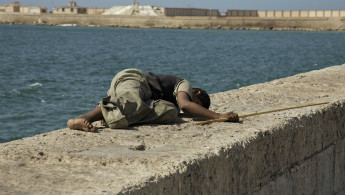Where are our children? Egyptian parents' Facebook plea
The majority of the adverts have been posted by parents in major metropolises such as Cairo and Alexandria, with details of their missing children.
"The trade of children by mafia gangs has become complex," said Mohamed Abu Hamed, a member of Egypt's parliament.
"But there is a presumption that the abduction of children involves extremist groups and those who are recruiting for terrorists."
According to the US state department's most recent report on human trafficking in Egypt, kidnapped children are often used as slaves, working on farms, building sites or alternatively as sex workers.
| Facebook Post |
| Translation: "Share out of kindness – This child is now with Professor Mahmoud Hassan on Hospital Street in the centre of Babaa – anyone who recognises her, please call us on 01283800701" |
"Individuals from the Gulf, including Saudi Arabia, United Arab Emirates, and Kuwait, purchase Egyptian women and girls for "temporary" or "summer" marriages for the purpose of commercial sex, including cases of sex trafficking, as well as forced labour," the US state department said in their report.
Organised criminal gangs usually demand ransoms from a child's family and a large number of children are also forced to beg on the streets.
Chilling Facebook groups have been set up named "Our Children is a Red Line", "Absent Children", "Missing Children" and "Hijacked Children" in a bid by desperate parents to find their loved ones.
The interior ministry does not give out statistics related to the kidnapping of children and so it isn't possible to know if the problem is growing. What is known, however, is that the suspected kidnapping of children has been a growing problem in Egypt since the 2011 revolution.
Due to a lack of police officers on the streets of Cairo, violent organised crime proliferated in the years that followed the downfall of the Mubarak regime. The official crime statistics for the years 2011-2013 showed that crime rates had tripled in the country.
This security situation, which was expected to improve after President Sisi came to power, has not gotten any better however.
Many activists are now calling on the government to work harder to prevent child exploitation and protect the country's most vulnerable citizens.
"The government does not attach enough importance to the problems suffered by children," said Hani Helal, a children's rights activist in Egypt.
The government's only shelter dedicated to housing the victims of trafficking closed in May 2015 and the majority of residents transferred to government-operated reception centres and shelters run by NGOs.
According to the US state department, victims of child trafficking are often even treated by the police as criminals and are punished for the actions of their kidnappers.
"Authorities continued to treat unidentified trafficking victims as criminals and punished them for unlawful acts committed as a direct result of being subjected to human trafficking," the state department said.
Official police advice is for parents to refuse to pay ransoms and report any kidnapping at a local police station. But the arrest and prosecution rate for kidnappers is notoriously low, leading parents to search for their children themselves by taking out social media adverts.



